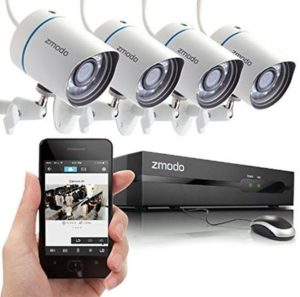
In today’s modern world, security has become an increasingly important concern for individuals, businesses, and communities alike. With the rise of advanced technology, one tool that has emerged as a key player in ensuring safety is the security camera. These unblinking eyes have become ubiquitous, lining the streets, businesses, and even our homes. But what truly lies behind the power and significance of these seemingly mundane devices?
The presence of security cameras can provide a sense of reassurance and deter potential wrongdoers. Knowing that their actions are being captured on film serves as an effective deterrent to those inclined towards illicit activities. Whether it’s a shop owner protecting their inventory or a neighborhood striving to maintain peace and order, security cameras act as a formidable line of defense, keeping a watchful eye over our surroundings. Apart from this preventive aspect, security cameras also play a crucial role in aiding law enforcement investigations, providing vital evidence that can lead to the identification and conviction of criminals.
However, the power of security cameras goes beyond just their role in crime prevention and detection. They also serve as a means of surveillance, monitoring public spaces for various purposes. From ensuring traffic flow efficiency to facilitating emergency response, security cameras have the ability to enhance the overall safety and security of communities. In an age where threats can emerge from numerous sources, having these watchful eyes scanning our surroundings can offer a sense of control and create a safer environment for all.
As we delve deeper into the world of security cameras, we will explore their technological advancements, ethical considerations, and the ongoing debates surrounding their usage. In an increasingly interconnected world, where privacy concerns tend to challenge the benefits of surveillance, understanding the power of security cameras becomes a necessity. So, join us on this journey as we uncover the significance behind the ever-watchful gaze of these unblinking eyes.
The Evolution of Security Cameras
The history of security cameras traces back to the invention of the closed-circuit television (CCTV) system in the early 1940s. Initially used for military purposes during World War II, these early cameras were bulky, expensive, and limited in their capabilities.
Over time, advancements in technology led to the development of smaller, more affordable, and more sophisticated security cameras. The introduction of digital technology revolutionized the industry, allowing for higher resolution imagery and easier storage and retrieval of footage.
Today, security cameras come in various forms, including dome cameras, bullet cameras, and discreet hidden cameras. They are equipped with features such as motion detection, night vision, and remote access, enhancing their effectiveness in monitoring and protecting properties.
With the rise of artificial intelligence (AI), security cameras are becoming even more powerful. AI-powered cameras can intelligently analyze video feeds, detect suspicious activities, and send real-time alerts to security personnel. This has significantly improved the proactive nature of security systems, enabling quicker response times and enhanced overall security.
In conclusion, security cameras have evolved greatly over the years, from basic CCTV systems to advanced AI-powered surveillance systems. These advancements have made security cameras an indispensable tool in ensuring the safety and security of various environments, ranging from homes to commercial establishments.
2. Benefits and Limitations of Security Cameras
Security cameras offer a range of benefits in various settings, enhancing safety, and providing valuable surveillance. However, while they have their advantages, they also come with certain limitations that should be considered.
Armed Security Guard Services Dallas
First and foremost, security cameras act as a deterrent. Their presence alone can discourage potential criminals from engaging in unlawful activities. Knowing they are being watched creates a sense of accountability and decreases the likelihood of incidents occurring in the first place.
Secondly, security cameras provide valuable evidence in the event of a crime or security breach. They capture visual footage that can be used by law enforcement agencies to identify perpetrators, gather information, and support their investigations. This footage can be crucial in solving crimes and bringing offenders to justice.
Another advantage of security cameras is their ability to monitor and protect large areas or properties. With a network of strategically placed cameras, surveillance can be conducted effectively, covering blind spots and detecting suspicious activities in real-time. This allows for prompt responses and ensures better overall security.
While security cameras have numerous benefits, it is important to acknowledge their limitations. One key limitation is the issue of privacy. The presence of cameras in public spaces can raise concerns about the invasion of privacy and the potential misuse of footage. Striking a balance between security and privacy remains a challenge that needs to be addressed.
Additionally, security cameras may not always capture incidents in their entirety. Factors like camera positioning, lighting conditions, and obstructions can affect the quality and visibility of the footage. This can hinder the accurate identification of individuals or the understanding of events, potentially impacting the effectiveness of using camera footage for investigations.
Furthermore, security cameras require proper maintenance and regular monitoring to ensure their functionality. An unattended or malfunctioning camera system can render the surveillance ineffective and compromise the security measures in place. Therefore, it is crucial to invest in reliable systems and establish a robust maintenance routine to address potential issues promptly.
In conclusion, security cameras offer numerous benefits, including deterring crime, providing evidence, and enhancing overall security. However, it is essential to consider their limitations, such as potential privacy concerns, limitations in capturing incidents, and the need for maintenance. Striking a balance between utilizing security cameras effectively and addressing their limitations is key to maximizing their potential for creating safer environments.
3. Ethical Considerations and Future Directions
In considering the increasing prevalence of security cameras, it is crucial to address the ethical implications surrounding their use. One key concern is the potential invasion of individuals’ privacy. With cameras becoming more advanced, capable of capturing high-resolution images and videos, there is a need for strict regulations to ensure that surveillance is used responsibly and within the limits of the law.
Another ethical consideration is the issue of consent. While security cameras are primarily installed for the purpose of protecting public spaces and deterring criminal activities, there is a fine line between maintaining security and infringing on people’s rights. It is essential for organizations and individuals deploying security cameras to inform and obtain the consent of those who may be captured within the camera’s range.
Furthermore, the potential for misuse and abuse of surveillance footage cannot be overlooked. There have been cases of security camera footage being used for unauthorized purposes or falling into the wrong hands. It is crucial to establish robust safeguards to protect the privacy and security of the recorded data, ensuring that it is utilized solely for its intended purpose.
Looking into the future, advancements in technology will continue to shape the capabilities and applications of security cameras. Artificial intelligence and machine learning algorithms are being integrated with surveillance systems, enabling enhanced facial recognition, behavior analysis, and predictive analytics. While these developments hold promise for improving public safety, they also raise concerns related to data security, bias, and the potential for discriminatory practices.
As we move forward, it is essential to strike a balance between utilizing the power of security cameras for safeguarding public spaces and respecting individuals’ rights to privacy. Continued dialogue and collaboration among policymakers, technology developers, and the public are necessary to define appropriate guidelines, regulations, and frameworks that ensure the ethical and responsible deployment and use of security cameras.



